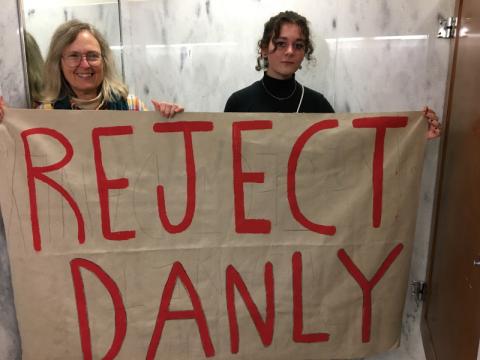Beyond Extreme Energy disrupts hearing for FERC nominee Danley
Three members of Beyond Extreme Energy (BXE) disrupted the Senate Energy and Natural Resources Committee hearing for James Danly, who was nominated by President Trump to be the third Republican commissioner at FERC, the Federal Energy Regulatory Commission. Two BXE members unfurled a banner reading “Reject Danly” and yelled "FERC: No more fossil lovers! Wind and solar now!" before being removed from the room and arrested.
Later BXE member Melinda Tuhus stood up and yelled "It's a climate emergency we need to turn FERC into FREC! The Federal Renewable Energy Commission!" while being hauled out of the room. All three activists have been released from jail!
The Danly nomination has been controversial with Energy and Natural Resource Committee Democrats because the Republican Danly was not paired with a Democrat nominee, as has been the norm at FERC for years. This move will tip the balance at FERC in favor of Republican partisanship. Danly is not qualified to be a FERC commissioner.
His philosophy of “the humble regulator” harkens back to the desire of conservatives to shrink government small enough to drown it in a bathtub. He is a strict constructionist whom one advisor to regulators says, according to an article in E&E, "To suggest that FERC may do nothing not explicitly stated is to misunderstand Congress' intent. Congress chose not to describe every specific tool the Commission may use, because no Congress would have the expertise or foresight to know what those tools are.” This brand of ‘malicious compliance’ will only worsen FERC’s reputation as a weak regulator. FERC has only rejected 2 out of 400 projects in the last 30 years.
The article continued, “Evidence of Danly's belief in the ‘humble regulator’ theory might be found in his leading the commission last year to abandon the approach it had employed toward evaluating the effects of downstream greenhouse gas emissions from natural gas projects, using authority found in the National Environmental Policy Act.”
Earlier this year, the U.S. Court of Appeals for the DC Circuit criticized FERC for its “decidedly less-than-dogged efforts to obtain the information it says it would need to determine that downstream greenhouse-gas emissions qualify as a reasonably foreseeable indirect effect of a project.”
Finally and most importantly, climate scientists say we have until 2030 to cut global greenhouse gases in half if we hope to avoid irreversible climate catastrophe. Building out fracked gas projects such as those that FERC rubber stamps will not cut it. We need to transform FERC into FREC — the Federal Renewable Energy Commission. Danly’s contributions would only send us backwards.


